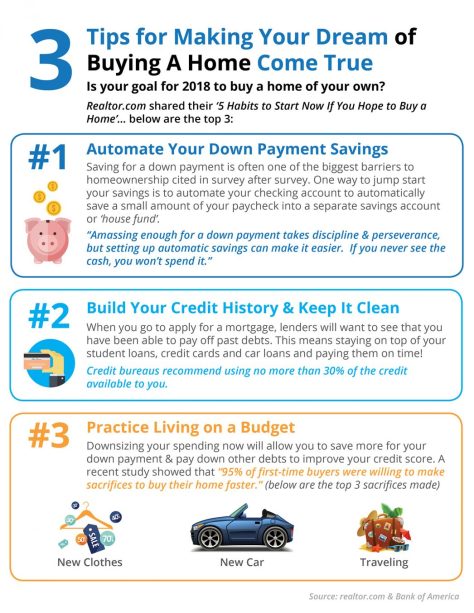Click the link below for additional info:
Tag Archives: market value
What Does It Mean to Sell A House “AS IS “?
Sometimes people inherit a home they simply need to unload and other times they don’t want to make the effort to make repairs or tune up the home’s curb appeal. In today’s world, it can also be a financial concern to finish projects or catch up on some of those deferred maintenance items.  For these home owners looking for a quick sale, they often think selling a home “as is” is the way to go. If you’re like most folks, you might think the “as is” sale means “take it or leave it” and “what you see is what you get.”
For these home owners looking for a quick sale, they often think selling a home “as is” is the way to go. If you’re like most folks, you might think the “as is” sale means “take it or leave it” and “what you see is what you get.”
But an “as is” sale isn’t necessarily a cakewalk. It doesn’t mean you’re completely exonerated from taking some responsibility for the home’s condition. While advertising a home “as is” lets buyers know they’re likely to have to do some work, it also broadcasts that the home is probably going to be a relatively good deal, provided they’re willing to take on repairs.
 “As is” doesn’t relieve you from disclosing problems with the home. What you know about, you must disclose by law. Failure to do so could get you into hot water. If you know about a problem but hope it slips by the buyer’s inspector, you’re at risk. The seller’s disclosure provided by most listing agents to their their sellers to fill out; is a great way to list any of the improvements you might have done on the home as well as a chance to give buyers an idea of how old the roof or the heating system might be… these are two questions almost every single buyer asks – they are concerned about the big ticket items needing to be replaced or repaired.
“As is” doesn’t relieve you from disclosing problems with the home. What you know about, you must disclose by law. Failure to do so could get you into hot water. If you know about a problem but hope it slips by the buyer’s inspector, you’re at risk. The seller’s disclosure provided by most listing agents to their their sellers to fill out; is a great way to list any of the improvements you might have done on the home as well as a chance to give buyers an idea of how old the roof or the heating system might be… these are two questions almost every single buyer asks – they are concerned about the big ticket items needing to be replaced or repaired.
And that’s another thing: “As is” homes still go through the inspection process. While your “as is” sale may indicate your unwillingness to make repairs, it doesn’t mean the buyer won’t ask you for compensation based on condition issues. You may not come out of pocket, but it could come right off the top of your listing price, so keep this in mind. What’s more, once these conditions come to light you generally must disclose them to future prospective buyers if the current one bails-in other words, if one buyer walks after an inspection – you must now disclosure all known defects to other prospective buyers. Keep in mind, safety and environmental issues or hazards are almost never – AS IS. Underground abandoned storage tanks, wood destroying pests, and lead paint are just a few of buyers concerns.
 With any luck, your “as is” buyer will be a cash buyer, but if not, prepare for the appraisal. Banks don’t want to loan money unless they deem the value of the home is acceptable. If the appraisal comes in low, your buyer may find themselves without the funds necessary to meet your price.
With any luck, your “as is” buyer will be a cash buyer, but if not, prepare for the appraisal. Banks don’t want to loan money unless they deem the value of the home is acceptable. If the appraisal comes in low, your buyer may find themselves without the funds necessary to meet your price.
While selling “as is” may seem like a viable alternative to bringing a house up to its full market potential, recognize there are some trade-offs. Go in informed and you’ll find the process much easier to navigate.
 Whether you’re looking to sell “as is” or not, I’m happy to help you get the best price possible for your home. Let’s talk when you’re ready!
Whether you’re looking to sell “as is” or not, I’m happy to help you get the best price possible for your home. Let’s talk when you’re ready!
Here’s how to know if you’re ready to sell your home.
I love to sell homes. It’s a privilege and an honor to be a part of the process. I get great satisfaction from making my living helping people move on to the next phase of their life, whether it’s upsizing, downsizing, or simply relocating to a new neighborhood.
But there is one sort of home seller I can’t really help: The seller who’s not really ready to sell.
If you’re thinking about selling your home, don’t enter into the process lightly. It’s a big deal. There’s some stress and there’s a great opportunity for joy. There’s a big investment at stake. This, along with a lot of other reasons large and small, is why you want to be 100% sure you’re ready to sell your home. If you think you’re ready to sell, but it turns out you’re not, you waste a lot of time and energy (and sometimes money).
about selling your home, don’t enter into the process lightly. It’s a big deal. There’s some stress and there’s a great opportunity for joy. There’s a big investment at stake. This, along with a lot of other reasons large and small, is why you want to be 100% sure you’re ready to sell your home. If you think you’re ready to sell, but it turns out you’re not, you waste a lot of time and energy (and sometimes money).
So how do you know if you’re really ready to sell your home?
1. You’re fine with the process. You must have no problem with the idea of a stranger poking around your house, talking about renovating it, or treating it like a used car. If you’ve lived in your house a long time, it’s natural to have emotional attachments. So if the process of selling the house makes you feel protective or defensive, you may not be ready.
2. You are flexible on the right price. Motivated sellers understand selling a home involves negotiation and competitive market pricing. If you have a number “you must get” in order to sell, then you might want to think again. Also, if all of the agents who price your home come back too low for your standards, take a breather and ask yourself if it’s go time or not.
3. You know where you’re going next. Prepared sellers have plans, even if those plans aren’t 100% firm. They’re anticipating the move and they are probably even shopping for houses, if only casually at the moment.  If you can’t clearly answer the question, “Where would you like to live after you sell?” then you’re not quite there yet.
If you can’t clearly answer the question, “Where would you like to live after you sell?” then you’re not quite there yet.
If you’re iffy on any of these, take a step back and consider how you feel. While some markets favor sellers more than others, a home can sell in any market for the right price. Don’t jump into something before you’re ready.
However, when you’re ready, we’d be happy to help. Give us a call when the time is right: Barbara & Gregg, The Nicholas Team of RE/MAX Village Square Realtors realestate@thenicholasteam.com 973-509-2222
Undertanding Your Home’s Equity
 The dream of home ownership is about more than just a stable place to live, exempt from the whims and decisions of landlords. For many, home ownership is a piece of the wealth building picture, essential to a future retirement or financial independence. The idea is pretty basic: You purchase a home and pay it down while hoping the value of the home increases over time. Generally speaking, this is what happens over a long enough period of time. (Remember, real estate is meant to be a long term investment.) As you go, you build what’s called “equity.”
The dream of home ownership is about more than just a stable place to live, exempt from the whims and decisions of landlords. For many, home ownership is a piece of the wealth building picture, essential to a future retirement or financial independence. The idea is pretty basic: You purchase a home and pay it down while hoping the value of the home increases over time. Generally speaking, this is what happens over a long enough period of time. (Remember, real estate is meant to be a long term investment.) As you go, you build what’s called “equity.”
Equity is defined as “the market value of a homeowner’s unencumbered interest in their real property—that is, the sum of the home’s fair market value and the outstanding balance of all liens on the property.” If you were to sell your home and pay off the balance of the mortgage (and any other debts, such as home equity credit lines or liens), the cash you would have leftover is your equity. Your “equity position” changes over time due to a variety of factors.
As you’ve probably noted, the biggest variable in your home equity position is the home’s true market value. A variety of factors can influence your home’s value, including: Market demand for homes in your area, local amenities, schools, your home’s particular features, upgrades you’ve made, condition issues, and quite a bit more. So how can you tell your equity position?
First, you need to know what you owe on your home. This is as simple as checking  your mortgage statement to see what your principle balance is on the loan. This number can differ slightly from your actual payoff amount due to closing dates, interest, and other issues determined during the sale, but generally speaking your principle balance is the number you need to know. If you have any other debt on the home, you need to add the value of this debt to the principle balance. This might include credit lines, liens, or second mortgages, for example.
your mortgage statement to see what your principle balance is on the loan. This number can differ slightly from your actual payoff amount due to closing dates, interest, and other issues determined during the sale, but generally speaking your principle balance is the number you need to know. If you have any other debt on the home, you need to add the value of this debt to the principle balance. This might include credit lines, liens, or second mortgages, for example.
Next, you need to know the value of your home. While there are sites such as Zillow and Trulia out there which will tell you what your home’s value is, these “automated valuation models” are generally not very accurate when it comes to your home’s value, as they exclude many crucial factors. Often they come in quite a bit higher. They can, however, give you an idea of general changing trends in your market over time. Learn more about market values and prices here.
Hiring an appraiser is one way to determine your home’s value from a more bank-like perspective. While an actual sale may be above the appraisal, this thorough, conservative option is a good way to go. The downside? You may have to pay up to $500 for the appraisal.
Of course, We’re happy to help you get a handle on your home’s current value with a comparative market analysis (CMA). Just get in touch today: THE NICHOLAS TEAM, Barbara & Gregg, realestate@thenicholasteam.com Office: 973-509-2222 ext. 1126





You must be logged in to post a comment.